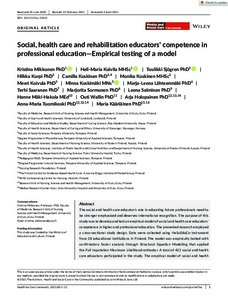Social, health care and rehabilitation educators' competence in professional education-Empirical testing of a model
Tuomikoski Anna-Maria; Wallin Outi; Kääriäinen Maria; Kuivila Heli-Maria; Sjögren Tuulikki; Korpi Hilkka; Koskinen Monika; Holopainen Arja; Salminen Leena; Mikkonen Kristina; Koivula Meeri; Koskimäki Minna; Saaranen Terhi; Sormunen Marjorita; Mäki-Hakola Hanne; Koskinen Camilla; Lähteenmäki Marja-Leena
Social, health care and rehabilitation educators' competence in professional education-Empirical testing of a model
Tuomikoski Anna-Maria
Wallin Outi
Kääriäinen Maria
Kuivila Heli-Maria
Sjögren Tuulikki
Korpi Hilkka
Koskinen Monika
Holopainen Arja
Salminen Leena
Mikkonen Kristina
Koivula Meeri
Koskimäki Minna
Saaranen Terhi
Sormunen Marjorita
Mäki-Hakola Hanne
Koskinen Camilla
Lähteenmäki Marja-Leena
WILEY
Julkaisun pysyvä osoite on:
https://urn.fi/URN:NBN:fi-fe2021100750295
https://urn.fi/URN:NBN:fi-fe2021100750295
Tiivistelmä
The social and health care educator's role in educating future professionals need to be stronger emphasised and deserves international recognition. The purpose of this study was to develop and test an empirical model of social and health care educators' competence in higher and professional education. The presented research employed a cross-sectional study design. Data were collected using HeSoEduCo-instrument from 28 educational institutions in Finland. The model was empirically tested with confirmatory factor analysis through Structural Equation Modelling that applied the Full Imputation Maximum Likelihood estimator. A total of 422 social and health care educators participated in the study. The empirical model of social and health care educators including eight competence areas: leadership and management, collaboration and societal, evidence-based practice, subject and curriculum, mentoring students in professional competence development, student-centred pedagogy, digital collaborative learning, and cultural and linguistic diversity. All of the connections between concepts of the empirical model were found to be statistically significant. There were strong connections between most of the identified competence concepts; however, two weak connections were found, namely, the link between competence in evidence-based practice and competence in subject and curriculum, along with the link between competence in digital collaborative learning and competence in student-centred pedagogy. The presented empirical model can help stakeholders identify which areas of social and health care educators' curricula should be further developed. The model is also relevant for improving continuous education, allowing educators to assess their competence levels and evaluating educators' performance at the organisational level.
Kokoelmat
- Rinnakkaistallenteet [19207]
